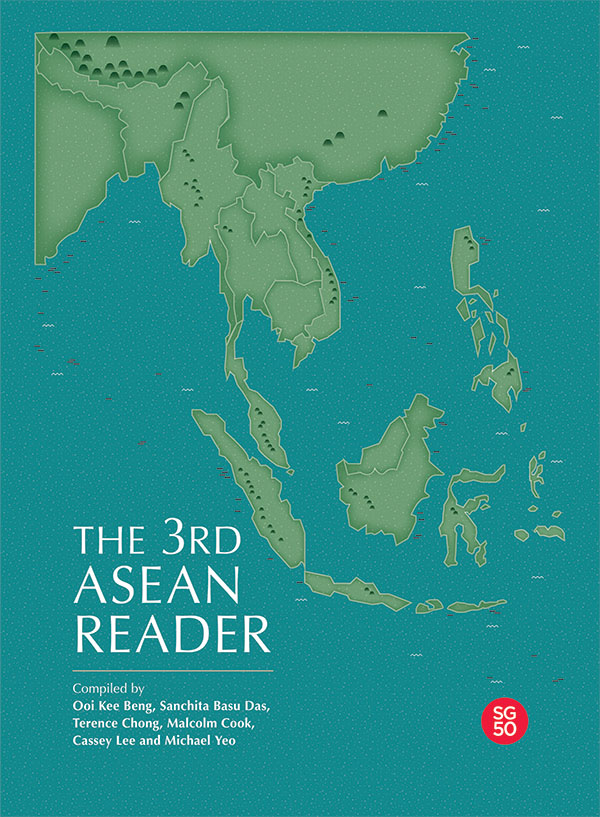Book contents
- Frontmatter
- Contents
- Preface
- Forewords to the First and Second ASEAN Reader: ASEAN: Conception and Evolution
- Forewords to the First and Second ASEAN Reader: ASEAN: The Way Ahead
- Forewords to the First and Second ASEAN Reader: New Challenges for ASEAN
- SECTION I ASEAN: THE LONG VIEW
- SECTION II COUNTRY ANALYSES
- SECTION III COMPARATIVE ANALYSES OF THE REGION
- Southeast Asian Societies
- The Southeast Asian Economy
- Southeast Asian Politics
- SECTION IV INTERNATIONAL DEVELOPMENTS
- SECTION V INSTITUTIONS OF ASEAN
- SECTION VI ASSESSING ASEAN'S INTERNAL POLICIES
- ASEAN Political Security Community
- ASEAN Economic Community
- ASEAN Socio-Cultural Community
- SECTION VII ASSESSING ASEAN'S EXTERNAL INITIATIVES
- ASEAN Processes
- 61 Driving East Asian Regionalism: The Reconstruction of ASEAN's Identity
- 62 Pakistan, SAARC and ASEAN Relations
- 63 Neither Skepticism nor Romanticism: The ASEAN Regional Forum as a Solution for the Asia-Pacific Assurance Game
- 64 ASEAN Plus Three and the Rise of Reactionary Regionalism
- 65 How the East Asia Summit Can Achieve its Potential
- 66 ‘Talking Their Walk’? The Evolution of Defense Regionalism in Southeast Asia
- 67 ASEAN FTAs: State of Play and Outlook for ASEAN's Regional and Global Integration
- 68 Taking ASEAN+1 FTAs Towards the RCEP
- 69 RCEP and TPP: Comparisons and Concerns
- 70 Enhancing the Effectiveness of CMIM and AMRO: Selected Immediate Challenges and Tasks
- ASEAN's Major Power Relations
- SECTION VIII SOUTHEAST ASIA: PERIPHERAL NO MORE
- Bibliography
- The Contributors
- The Compilers
70 - Enhancing the Effectiveness of CMIM and AMRO: Selected Immediate Challenges and Tasks
from ASEAN Processes
Published online by Cambridge University Press: 22 June 2017
- Frontmatter
- Contents
- Preface
- Forewords to the First and Second ASEAN Reader: ASEAN: Conception and Evolution
- Forewords to the First and Second ASEAN Reader: ASEAN: The Way Ahead
- Forewords to the First and Second ASEAN Reader: New Challenges for ASEAN
- SECTION I ASEAN: THE LONG VIEW
- SECTION II COUNTRY ANALYSES
- SECTION III COMPARATIVE ANALYSES OF THE REGION
- Southeast Asian Societies
- The Southeast Asian Economy
- Southeast Asian Politics
- SECTION IV INTERNATIONAL DEVELOPMENTS
- SECTION V INSTITUTIONS OF ASEAN
- SECTION VI ASSESSING ASEAN'S INTERNAL POLICIES
- ASEAN Political Security Community
- ASEAN Economic Community
- ASEAN Socio-Cultural Community
- SECTION VII ASSESSING ASEAN'S EXTERNAL INITIATIVES
- ASEAN Processes
- 61 Driving East Asian Regionalism: The Reconstruction of ASEAN's Identity
- 62 Pakistan, SAARC and ASEAN Relations
- 63 Neither Skepticism nor Romanticism: The ASEAN Regional Forum as a Solution for the Asia-Pacific Assurance Game
- 64 ASEAN Plus Three and the Rise of Reactionary Regionalism
- 65 How the East Asia Summit Can Achieve its Potential
- 66 ‘Talking Their Walk’? The Evolution of Defense Regionalism in Southeast Asia
- 67 ASEAN FTAs: State of Play and Outlook for ASEAN's Regional and Global Integration
- 68 Taking ASEAN+1 FTAs Towards the RCEP
- 69 RCEP and TPP: Comparisons and Concerns
- 70 Enhancing the Effectiveness of CMIM and AMRO: Selected Immediate Challenges and Tasks
- ASEAN's Major Power Relations
- SECTION VIII SOUTHEAST ASIA: PERIPHERAL NO MORE
- Bibliography
- The Contributors
- The Compilers
Summary
Recent crises, particularly the on-going sovereign debt crisis in the euro area economies, has provided momentum to greater regional financial cooperation in the region. Through the establishment of the Chiang Mai Initiative Multilateralisation (CMIM) and the ASEAN+3 Macroeconomic Research Office (AMRO) in March 2010 and May 2011, respectively, substantial headway has been made in this regard. The role of AMRO as a surveillance office for the CMIM is vital to the overall success of regional financial cooperation; without a credible and qualified surveillance capacity, it is difficult to envision an effective CMIM.
RECENT COMMITMENTS
The CMIM
During the Annual AFMGM+3 Meeting in May 2012, several other major new commitments were announced. Responding to the potential need for a larger swap facility, the CMIM Executive Committee announced the doubling of the swap facility to $240 billion in May 2012. Given the adjusted contribution, while keeping the “purchasing multiples” unchanged, major ASEAN economies (Indonesia, Malaysia, Philippines, Thailand, and Singapore) now have access to approximately $22.76 billion each, an increase from $4.55 billion previously.
At the same meeting, an increase in the IMF de-linked portion from 20% to 30% was also announced. A number of ASEAN+3 economies in fact proposed a higher de-link portion, but as a group eventually agreed to review the issue again in 2014, with the intention of further increasing the de-linked portion to 40%. During their deliberations, it was acknowledged that one of the key factors behind the doubling of the total swap facility and the rise in the de-linked portion is the recognition of the speedy establishment of the ASEAN+3 Macroeconomic Research Office (AMRO) and the timely delivery of well-received AMRO surveillance reports by the Executive Committee during the Deputies Meeting in Sendai, Japan in December 2011 and in Phnom Penh, Cambodia in March 2012. Furthermore, reflecting their appreciation of the urgency in anticipating and preventing future financial crisis, the ASEAN+3 Finance Ministers and Central Bank Governors approved the establishment of an additional function for the CMIM — a crisis prevention function, in addition to the crisis resolution function.
Under the current framework of the CMIM, a detailed set of operational guidelines was established, which would enable any swap requests to be processed efficiently and in a timely manner, typically within seven days of a request being made.
- Type
- Chapter
- Information
- The 3rd ASEAN Reader , pp. 367 - 370Publisher: ISEAS–Yusof Ishak InstitutePrint publication year: 2015



